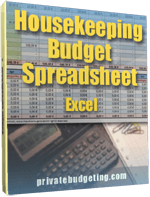How to choose the right budgeting tool?
In this day and age, with new-fashioned and traditional budget systems existing on an equal footing, you're spoiled for choice when it comes to choosing a budget solution that's right for you. While all of them are designed to help you reach your financial goals, they often use different strategies to get you there. They may also raise different security issues and vary in price. Below you find some considerations to help you find a solution that resonates with your desires and expectations.
All budget systems have one thing in common; their purpose is to help you to get more control over your money. Where they differ from each other is the way they can be used and whether they are free or cost money. Some budget tools utilize your computer while others are to be executed as apps on mobile devices. Some budgeting systems need access to the internet while others work offline, as is the case with an Excel-spreadsheet. Budgeting can even be as simple as keeping an account book the oldfashioned way by literally keeping a book in which you write your daily transactions; you can still pick one up at a stationery or office supply store. Another way to budget is via paper and a pen.As I walked through some of the main questions that I wanted to resolve before deciding upon a budgeting tool, I realized that different budgeting solutions on the web were in fact not so different after all. I’ve boiled things down to the following three key questions that you might want to look into before settling for a budgeting system.
-
consideration #1:
Do you want to provide your financial data or your Bank and Credit Card Login Information to online services? -
consideration #2:
Are you willing to pay for budgeting tools? -
consideration #3:
What kind of functionality do you seek in a budgeting tool?
Remember: There is no single budgeting solution that works the same for everyone since people have different needs and price expectations. But in personal finance we all can agree that there are basic assumptions, such as incurring debts is "bad" and being able to put aside emergency funds is "good", that holds true for all kinds of budgeting strategies. What requires a more subtle consideration is the way you spend and save your money, though. Just as there are good and bad ways to spend and save it, there are good and bad ways to budget. Put simply, what works for you is good, or more specifically, a good budgeting system meets your needs in terms of your price expectation, addressing your goals and security concerns. Since budgeting is a process and works best if done on a consistent basis, the budget system of your choice should also motivate you to keep on budgeting. As with many new things, it may take time to get used to budgeting, so don't be too hard on yourself if you don't click with it right away.

